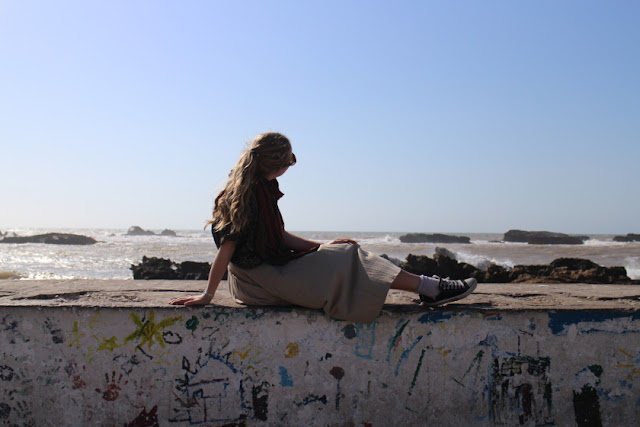We had an incredible ten days in Morocco but there are some things I wish I’d known before I left that would have really helped me on my way. In the absence of finding anything else like this in the blogosphere, and with the beauty of hindsight, I collaborated with my lovely travelling partner Brittany to come up with our top tips for anyone thinking of backpacking around this country.
Use local transport: CTM and Supratours are particularly good and the system is established; you get a ticket for a really reasonable price (usually between 40 to 100 dirham which works out about 4-10 euros) and they load your baggage in a professional manner (but it comes at a five dirham cost, don’t forget to pay before you board!). Most cities have regular times and they usually don’t fill up, but check where you’re going as Chefchoauen in particular is more difficult and tickets sell out quickly. There is often wifi at the stations and some of the upgraded buses even have free wifi on them. Trust me, it really it the best way to travel cheaply, flexibly and comfortably.
But everything runs on Moroccan time: This means that the buses usually leave late and arrive even later. On one bus we got in two hours after the supposed arrival time. Just go with it, and remember to book a hostel/hotel pick up a bit later than you would expect, there are always cafes to wait at if you do arrive early.
Taxis are a great way of getting around a city: But never pay the first price they offer unless it’s based on a meter (that is switched on and you can see running). Always ask for the meter, if they say no try to bargain for half the price, you can expect to be offered 50 dirham and we usually got it down to around 20/30 dirham. Pointing out that 50 is the tourist price usually reduces the cost, night tariffs shouldn’t be much more than the meter, double at most, and three people do not cost more. This is particularly relevant in Essaouria and Marrakech. Casablanca and Chefchaouen use meters or start out at more reasonable prices.
Grand taxis cost more than petit taxis: So don’t use them around the city. However they are great for getting between close cities (Essaouria – Agadir for example) if you can’t use the bus, although it’s cheaper to share so you will have to wait for them to fill up.
Taxis more often that not can’t take you into the medinas: Learn where the nearest bab (gate) is and tell them to take you there. Hostels will usually meet you when you first arrive and just pay attention to the route you follow, but definitely try and arrange this in advance.
Most of the hostels we stayed at were lovely and great value: We found them all from hostel world. Pay attention to reviews not pictures; the hostel with the nicest photographs turned out to be damp and dingy but elsewhere we felt the images didn’t do them justice.
Riads can be amazing places to stay: and it is often worth paying a little extra for the luxury.
Not every speaks English: So don’t expect them to. French is very useful in the South and Spanish in the north, and of course everyone speaks Arabic so if you can learn a few phrases it can really help (thank you Brittany and her semester of Arabic!). If all else fails pointing will often do the trick but knowing how to say ‘where is’ and ‘thank you’ in the above three languages will make things miles easier.
Trust People: Everywhere we went the locals were very helpful and guided us towards the places we wanted to go. Sometimes they will expect money for this but you are under no obligation, only pay what you feel comfortable. Assume they want to do it because they are nice (this is more often that not the case) but don’t be surprised if they ask, ten dirhams (1 euro) is enough and if something was difficult to find I never minded paying for the help.
Go to a hammam: It is a really fun and luxurious experience, and most places are not expensive. Your skin will feel amazing and it’s great fun. We just asked at our riad for the nearest recommended place and it was fantastic.
Hold on to small change: Cash machines will always dispense 100/200 dirham notes but 5 and 10 dirham coins are always incredibly useful.
And our best advice?
Just roll with it: We loved Morocco and found it to be a surprisingly relaxing adventure but a lot of that came from us accepting what we could not control and just enjoying whatever happened. Buses were late, we ate unexpected food in restaurants where the menu was only in Arabic, and we followed an impromptu tour with an Essaourian who wanted nothing more than to practise his English and enjoy our company. Be safe, but recognise that some great experiences come from going with the flow and enjoying yourself along the way.


No comments:
Post a Comment
Thank you so much for taking the time to comment and share your thoughts with me. I read and reply to each and every one.